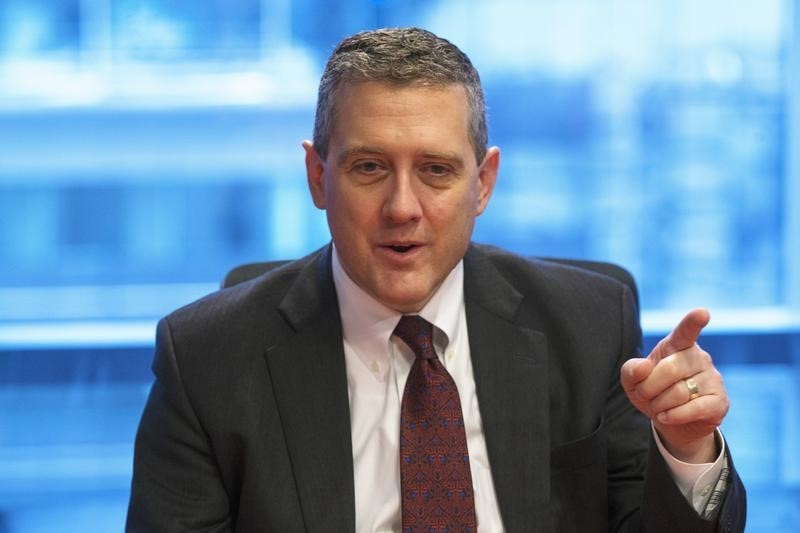(Bloomberg) -- One of the Federal Reserve’s most dovish policy makers says financial-market turmoil and a slowing global economy don’t warrant taking action before the central bank’s scheduled meeting on Sept. 17-18.
“I don’t think so,’’ St. Louis Fed President James Bullard told Fox Business Network on Thursday when asked about a possible emergency meeting. “The timing is never critical on these things. A couple of weeks one way or another probably doesn’t matter. What matters is that you are in the right zone for interest rates and that you are reacting appropriately to incoming data.’’
Speculation of a rare inter-meeting Fed move gained traction among traders amid an escalating U.S.-China trade war and deepening global economic gloom, which has slammed stocks and flashed recession warnings from the bond market.
Bullard bills himself as the most dovish policy maker on the Federal Open Market Committee. He dissented in June in favor of a quarter-point rate cut, which the FOMC delivered in July. Investors have fully priced in the bet that Chairman Jerome Powell and his colleagues will cut rates for a second straight meeting next month.
The St. Louis Fed chief said he wouldn’t “prejudge’’ the need to cut rates in September, adding policy should be based on the outlook for the economy and inflation rather than backward-looking data, which he noted have been solid. Consumer spending has been upbeat, Bullard said, pointing to Walmart (NYSE:WMT) Inc.’s strong quarterly sales and national July retail sales.
Bullard was also skeptical of recession worries prompted Wednesday when a key portion of the yield curve, between two-year and 10-year Treasuries, inverted for the first time since the financial crisis. Yield-curve inversions, when returns on shorter-dated Treasuries rise above those on longer-dated ones, have provided an early U.S. recession warning in the past.
“Any inversion that is going to send a bearish signal for the U.S. economy would have to be sustained over a period of time, so we are going to have to wait and see on that,’’ Bullard said. “You have got this flight to safety going on’’ with foreign investors seeking the perceived sanctuary, and positive yields, of U.S. bonds.
A greater concern is market measures of inflation expectations, which point to investors predicting as little as 1% inflation over the next five years, Bullard said. The central bank has set a goal of 2% inflation.
“That is not high enough to meet our target so that is something I will definitely take into account if it is sustained going forward,’’ he said.
Bullard’s comments found favor with at least one official in Washington: White House trade adviser Peter Navarro, who has called on the Fed to cut interest rates further.
“Listening to Bullard I thought was very very encouraging. He said we’re far far away from tripping the Fed’s inflation target,” he told Fox Business Network. “Between James Bullard and I, I think we’re presenting a very bullish picture.”
